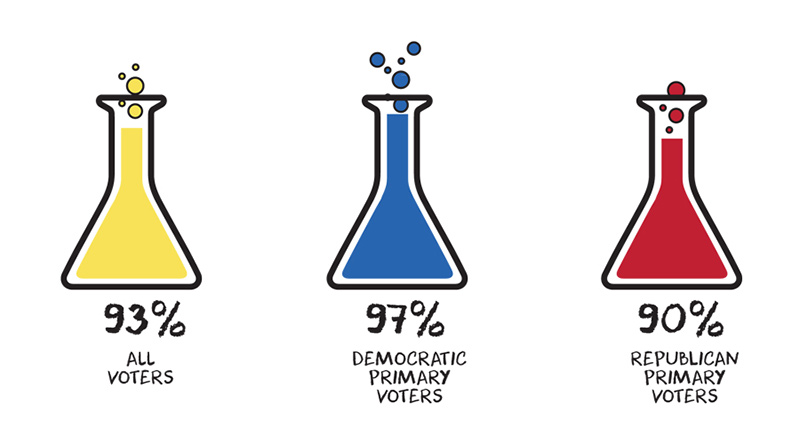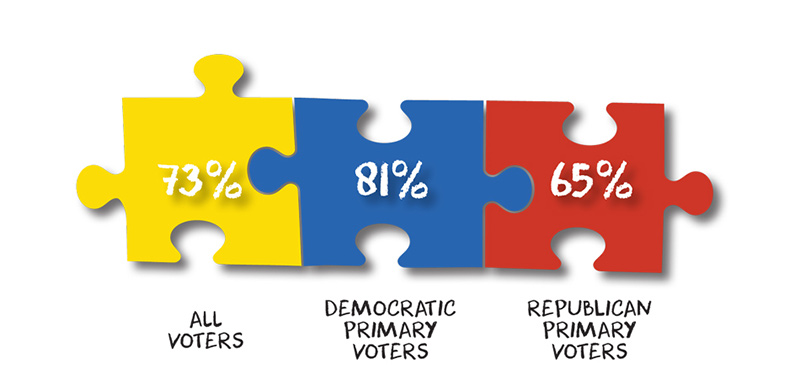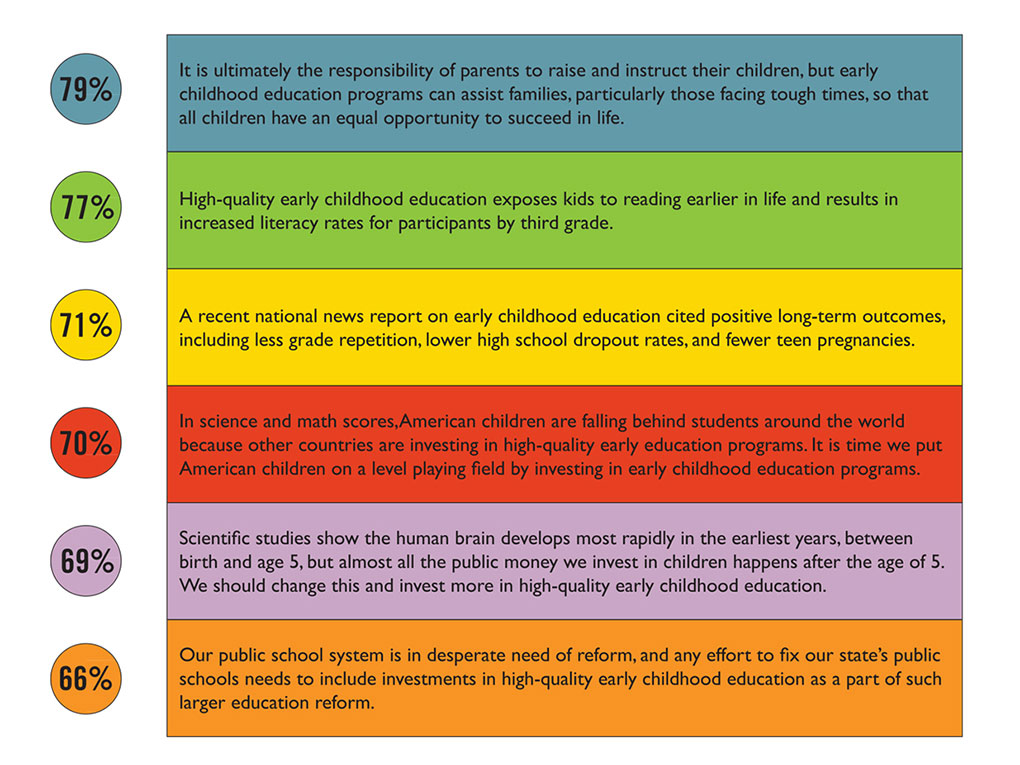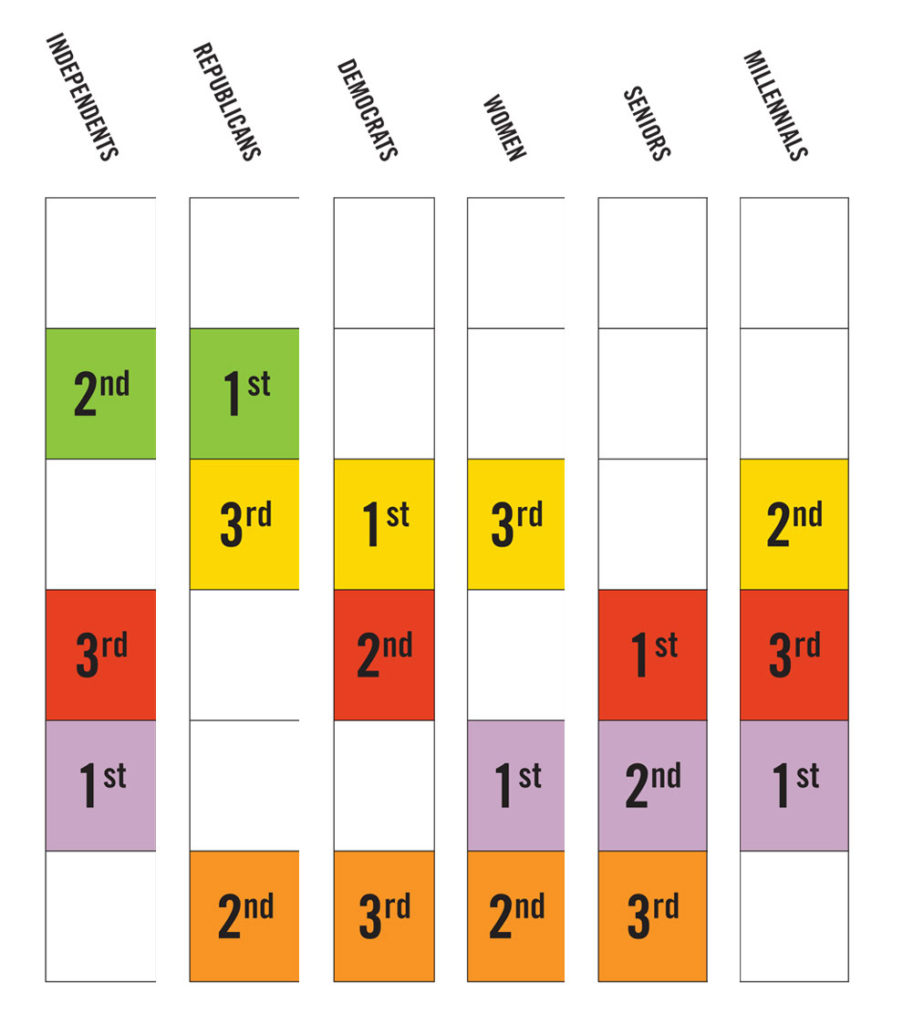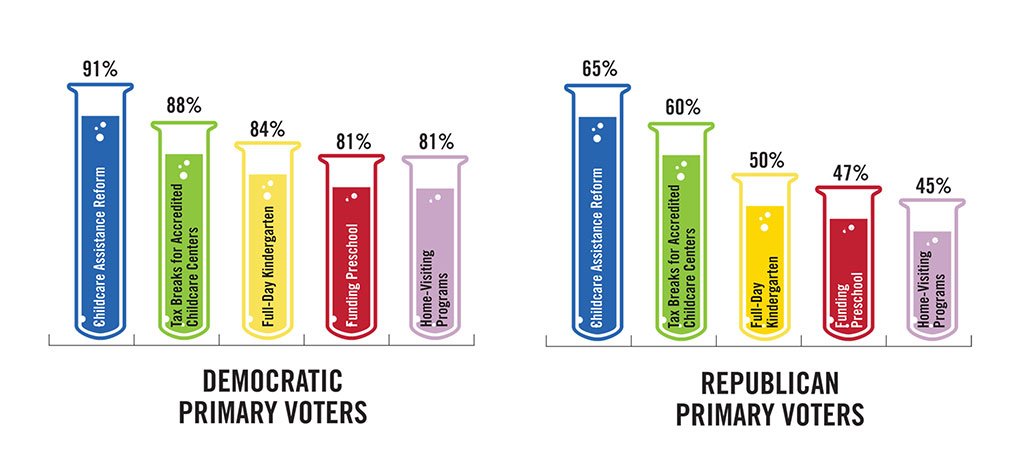Jump to Sections:
New Hampshire Voter Attitudes on Early Childhood Education
Message Guidance for Candidates on Early Childhood Education
Policy That Advances High-Quality Early Childhood Education
• • • • • • Education, Including Preschool, Is the Leading Issue
Voters rank improving New Hampshire’s education system—including preschool—as an
“extremely or very high priority,” EVEN when compared to other popular issues.
• • • • • • Voters Agree: The Early Years Are Important
Voters recognize the vital role education can play in the early years of development, saying ages
0 to 5 are important, with a majority of voters recognizing that these years are “extremely important.”
• • • • • • Voters Support Expanding Preschool
An overwhelming majority of voters are more likely to vote for a candidate who said this about preschool:
“Parents have a right to know the child care they use provides a safe, quality environment for their children.
Only 8% of childcare programs in our state are nationally accredited, and access to information about the
quality of facilities is extremely limited. I want to implement a new system that provides parents with quality
ratings of centers and encourages centers in our state to improve the quality of child care they offer.”
• • • • • • Child Care: A Bipartisan Issue
There is strong bipartisan agreement on changing child care assistance. Majorities of both
parties agree they’d be more likely to vote for a candidate who would change how state-funded
child care assistance works and end the strict income cutoff to benefits.
Message Guidance for Candidates on Early Childhood Education
The six statements below are powerful messages that resonate with New Hampshire voters to support
new investments in early childhood education. At least 66% of voters say these statements are
convincing arguments in favor of early childhood care and education.
Below are the top three messages ranked in order of most powerful for each target audience
of voters, color coded to correspond with the message chart.
Policy That Advances High-Quality Early Childhood Education
• • • • • • SUMMARY: PRESCHOOL SHOULD BE UNIVERSALLY ACCESSIBLE
Fifty-one percent of New Hampshire voters believe public education should start at pre-K and be
offered to all 4-year-olds. Only 9% say it should be offered to low-income kids, and just 36%
think it should not be part of public schools. While Republicans are more divided, large majorities of
Democrats and Independents want preschool.
The following are policy proposals that New Hampshire voters overwhelmingly support to expand
preschool and invest in early childhood education, ranked in order of popularity. The total
percentage is the sum of voters who are “much more” or “somewhat more likely” to vote for a
candidate who advocates for these policies during his or her campaign.
In New Hampshire it should pay to work hard. I support changing the way childcare assistance works
so that we can end the cycle of poverty. Families that reach a certain income level get cut off from any
childcare assistance. Instead of a strict cutoff, I believe we should gradually lower the amount of assistance
families get, so that they still have help with childcare costs, enabling them to get out of poverty and
move into the middle class.
Parents have a right to know the child care they use provides a safe, quality environment for their
children. Only 8% of childcare programs in our state are nationally accredited, and access to information
about the quality of facilities is extremely limited. I want to implement a new system that provides parents
with quality ratings of centers and encourages centers in our state to improve the quality of child care
they offer.
New Hampshire is one of the few states that has no funding allocated for preschool programs — not
even for low-income children. That means over 19 thousand low-income kids who could benefit most
from high-quality early education have no access to pre-kindergarten. I want to expand funding so at least
the lowest-income 4-year-olds who want to attend preschool have access in our state, and help ensure more
kids have an equal opportunity to succeed.
The State of New Hampshire can assist families and help parents by providing voluntary home visiting
programs that vulnerable parents can access, such as programs for young first-time at-risk mothers. We
currently reach less than 1% of the families who need these programs and I support expanding this to reach
more families and young mothers so our children’s parents can parent better.
Currently, New Hampshire is only funding 80% of full-day Kindergarten through the state, with the potential
for the other 20% of funding to come from the Keno Lottery. If Keno doesn’t perform well, that means we are
under-funding the first point of learning for New Hampshire children. I want to expand our investment in
Kindergarten beyond Keno so our Kindergarten programs are fully funded.
• • • • • • DID YOU KNOW?
Voters Want Investments in Early Education, Even if It Means a Slight Tax Increase
Fifty-eight percent of voters said they would support a candidate that came out in FAVOR
of investing in high-quality early childhood education programs and child care, even if it meant a
slight tax increase. Among the 58 percent, Republican primary voters are more likely to
support this policy by 26 percent, and Democratic primary voters support it by 82 percent.

